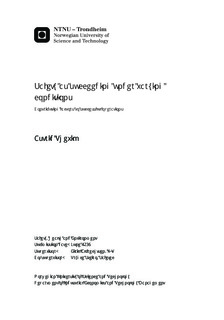Safety as succeeding under varying conditions: Contributing factors to successful operations
Master thesis
Permanent lenke
http://hdl.handle.net/11250/266846Utgivelsesdato
2014Metadata
Vis full innførselSamlinger
Sammendrag
Background: Traditional safety thinking has been concerned with investigating accident causations in order to learn from these. It would be interesting to shift the focus towards learning from all the operations that go well in the same manner. After all, the successful operations constitute the great majority of all the operations Objective: The main goal of this master thesis is to study what factors might contribute to successful operations in terms of safety. In relation to this it is also relevant to look into the definition successful operations. Method: The empirical study comprises of 10 interviews with people who work on board a drilling rig currently operating in Norway. The informants who participated in the interviews hold different positions and come from different companies represented on board the rig. The thesis does also include a literature review upon related theories.Results and conclusion: The findings in this study show that it can be difficult to characterise or define successful operations. The definition will be subjective; however there are some common features of successful operations. Maintaining the life and health of people are the number one priority. A successful operation should also result in the intended product even though it might take some more time than planned. A successful operation is created by many factors and conditions. This study identified 27 factors that might contribute to successful operations in terms of safety. It can be difficult to pin point exactly what factors that might create a successful operation. A lot of the theory focuses on informal factors related to humans and their actions, however the findings in this study implies that there must be both formal and informal factors present. It seems like these are both equally important.
